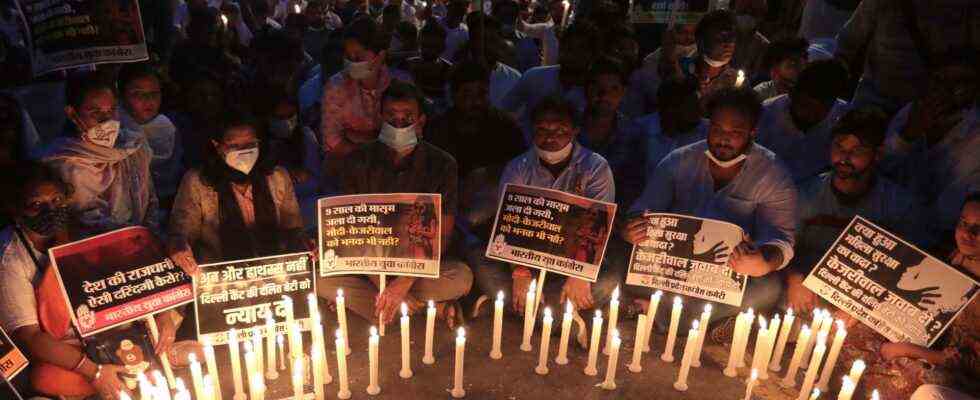Status: 09.08.2021 4:30 a.m.
In India, a girl, a member of the discriminated Dalit, was allegedly raped and killed in a crematorium. When the police arrived, the child was cremated. Activists are demanding consequences.
Sunita sits on the floor in her home, a windowless room in a cramped old house in Old Nangal, a poor neighborhood in western Delhi. Next to her sits Mohanlal, her husband. Behind her, textile waste piled up in large plastic bags, the family lives from collecting and begging. Sunita still can’t understand it. Your daughter is dead.
“She went out to get drinking water,” she says. “There’s a machine like that over in the crematorium. We workers all go there to fetch our water.”
Girl found lifeless
It is a terrible story that Sunita tells. The name of her daughter, who was apparently the victim of an act of violence, is not allowed to be mentioned in India, that is the law. That is why she is called Gudiya, a nickname. Some time after Gudiya left, the mother said the Hindu priest came to her, who accompanied the cremations at the nearby crematorium, as is customary with Hindus. Your daughter was electrocuted, he said.
The mother then walked the few hundred meters with the priest to the crematorium. There she saw her daughter lying – lifeless, with obviously serious injuries. “I wanted to call the police first and then go to the police station, but the priest tried to talk me out of it,” she says. “He said you’re just a rag picker and a beggar. How are you going to go to court?”
The police were then called, but before they came, the priest had set the eight-year-old’s body on fire – with the help of three men who are said to have been accomplices. What happened is now difficult to investigate.
“Justice for Gudiya” is written on a self-painted poster with which several people protest after the girl’s death.
Child from Dalit family
You should have shown them to the doctor, they should have examined them properly, says her father Mohanlal. “But they ironed us and told us to shut up.” The priest admitted to having raped the eight-year-old, but only after he was beaten.
Beaten up by the police? Or from angry residents? Father doesn’t say that. In any case, he prefers not to speak much, the alleged perpetrator, the Hindu priest, is very respected. But Mohanlal and his family are Dalit and thus belong to a group of people who are most discriminated against. On paper they have all rights and opportunities, but in reality they have no chance – and live in holes like here in Old Nangal.
Protests and allegations against police and politics
But not all of them want to put up with it. A group of young men are walking through the slums, shouting: “We are with you. Hang the rapists!” They are demanding justice. It is not a spontaneous protest, a Dalit organization called Bhim Sena is behind it. Its leader, Nawab Satpal Tanwar, throws police and politics to downplay the case – because a Hindu priest was the perpetrator and Gudiya, a Dalit girl, the victim.
“We have been watching this incident for a few days,” says Tanwar. “Politicians play their games with it. That’s why I come here with my people. What’s the problem with the police? Why aren’t the authorities doing anything? If she weren’t a Dalit daughter, but a girl from another caste, it would be very different.”
The priest and three alleged accomplices are now being investigated for murder and rape. You are in custody.
A Dalit activist assures the dead girl’s mother that his organization will work for justice.
Image: Peter Hornung / ARD Studio New Delhi
Laws tightened
Sexual violence, especially against girls and women, is not uncommon in India. Laws were tightened significantly following a fatal gang rape on a bus in Delhi in 2012, which was reported around the world. The death penalty threatens.
Nevertheless: In Old Nangal they are afraid that everything will be swept under the carpet again. Sunita, the mother, only has memories of Gudiya, her only child:
She always loved to drum, sing and dance. And she spoke very cleverly and explained everything to us very well. And when someone was naughty to her, she was very self-confident and said: How dare you say that to me? I’m a girl! My daughter was very kind, ask the neighbors. She could make a crying person laugh.

